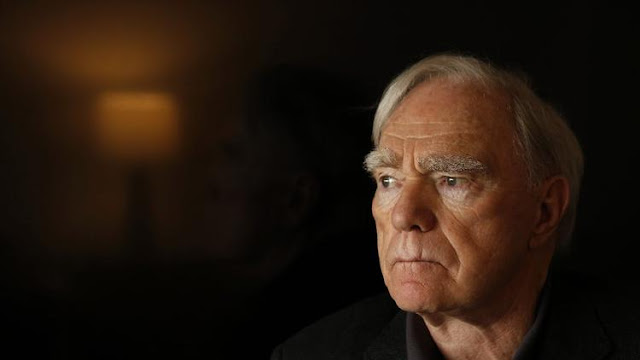Helping you tell better stories
Helping you tell better stories;
closer to your vision than you ever dreamt possible.
Wednesday
No More Excuses...
Well, this is nice: a free grammar checking plugin for my web browser now has a personalised referral link here and, if you sign up and install their browser extension, we both get a week of their Premium service free. Win-win.
There are so many reasons to have a smart virtual assistant watching over your shoulder, it's really crazy not to install one. Sure I don't agree with everything it suggests, and sometimes I just wanna riff on the English language, but it's great to have issues flagged up before you proofread.
Now a word of caution: I'm not certain that I'd recommend installing it in your main writing app, where free-flowing thoughts are of paramount importance and editing should be left to later, but online and for writing blogs it's very handy indeed. It really speeds things up.
When you first sign up there is an option for American or British English and in my case it was initially set to American but easy to change. Then as far as I can recall that's it, you're ready to go. It pops a little green G in the lower right corner of the text box you're typing in, which turns red and shows a number corresponding to flagged potential errors. You can ignore the suggestions if you wish.
Lastly, one thing you might want to look out for: in certain web forms I've noticed it caused sporadic flickering of the text box while it refreshed its overlaid suggestions, but once I realised the cause it was simple to disable it temporarily by rolling over the circle and clicking the power button symbol.
Try it out, see if it fits your needs, and let me know below in the comments if it was helpful to you.
RK
Monday
Do Better Movies Make More Money?

The always interesting Stephen Follows has impressed again with a simple bit of statistical analysis this week, probing into the correlation (or lack thereof) between a film's quality — as measured by a film's Metascore — and its profitability, where known.
There are some surprising results, especially when the numbers are broken down by genre.
Go here to read the full article.
RK
Tuesday
Robert McKee — Dialogue
The particularly sharp among you may have noticed that I haven't written a lot about Robert McKee on this blog. The only reason for that is that he hasn't done much lately (that I know of) but I like his book Story very much, and he is second on my recommended reading list, after Truby.
(That list is on the right hand side here somewhere... down... down... keep scrolling... that's it).
Today I saw this article about, and interview with, him — because he has a new book out.
“Becoming a writer … it’s going to cost you time,” McKee said, looking out over the room of about 150 students, a diverse mix of ages and races. “It’s going to cost you money. It’s going to cost you people.”
Enjoy.
And maybe at some point I'll review it.
RK
Wednesday
Playwright
A very decent pub lunch with friends this weekend was made even more pleasant by my conversation with someone I hadn't met before – a sometimes writer himself, and long-time TV producer.
Somehow we got to talking about dramaturgy, and he reminded me that the origin of the word "playwright" is not what one might assume. From Wikipedia:
The term is not a variant spelling of "playwrite", but something quite distinct: the word wright is an archaic English term for a craftsman or builder (as in a wheelwright or cartwright).
Hence the prefix and the suffix combine to indicate someone who has "wrought" words, themes, and other elements into a dramatic form - someone who crafts plays. The homophone with "write" is in this case entirely coincidental.*
The term playwright appears to have been coined by Ben Jonson in his Epigram 49, "To Playwright",[1] as an insult, to suggest a mere tradesman fashioning works for the theatre. Jonson described himself as a poet, not a playwright, since plays during that time were written in meter and so were regarded as the province of poets. This view was held as late as the early 19th century. The term playwright later lost this negative connotation.
* Actually I doubt that the homophone with "write" is coincidental at all. Both words come from Old English, and can be traced far earlier, so I suspect a bit of intentional wordplay. But isn't it interesting how it stuck? The connotations of physically grappling with the raw material, and hammering it into shape are so much more emotive than the plain descriptive act of scratching ink onto paper.
RK
Ummmmm
OK wow. It's been a year since I posted, and while a part of me feels bad about that, many, many other parts of me think that we really left this blog place in a good way.
What can I say? Sorry. I have been effing busy.
I'll be back for sure, but for now probably everything you need to know about screenwriting and marketing is probably here somewhere. That was my goal.
Let's be honest: all that's missing henceforth are the war stories, and I'm sure they'll be along shortly.
Cool. See you all soon,
Robin
What can I say? Sorry. I have been effing busy.
I'll be back for sure, but for now probably everything you need to know about screenwriting and marketing is probably here somewhere. That was my goal.
Let's be honest: all that's missing henceforth are the war stories, and I'm sure they'll be along shortly.
Cool. See you all soon,
Robin
Subscribe to:
Comments (Atom)



